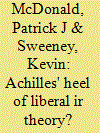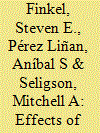| Srl | Item |
| 1 |
ID:
080173


|
|
|
|
|
| Publication |
2007.
|
| Summary/Abstract |
Despite substantial evidence that international trade has promoted peace in the post-World War II era, the commercial peace research program still faces an important historical challenge. Dramatic economic integration in the nineteenth century failed to prevent the increasing interstate hostilities that culminated in the outbreak of war in 1914. This article uses a theoretical revision grounded in standard trade theory to reexamine the relationship between commerce and peace in the fifty years before World War I, a period often referred to as the first era of globalization. The article focuses on domestic conflict over commercial policy rather than on interdependence to understand the conditions under which globalization promotes peace. In a sample dating from 1865 to 1914, the authors find that lower regulatory barriers to commerce reduce participation in militarized interstate disputes. Contradicting conventional wisdom, this evidence affirms a basic premise of commercial liberalism during the first era of globalization-free trade promotes peace
|
|
|
|
|
|
|
|
|
|
|
|
|
|
|
|
| 2 |
ID:
080174


|
|
|
|
|
| Publication |
2007.
|
| Summary/Abstract |
Democracy promotion has been an explicit doctrine of U.S. foreign policy since the end of the cold war. Between 1990 and 2003 resources for democracy programs increased by over 500 percent. Has this policy worked? Prior research has been inconclusive, relying either on case studies or on quantitative efforts that have not distinguished overall foreign assistance from democracy promotion. The authors answer this question using a new data set that includes program information for 165 countries for the years 1990-2003. The analysis distinguishes between direct and indirect causal mechanisms and employs a variety of statistical models that allow the authors to control for the unique democratization trend in each country when assessing causal effects, as well as for the potential endogeneity of U.S. democracy assistance. The analysis shows that democracy assistance does indeed have a significant impact
|
|
|
|
|
|
|
|
|
|
|
|
|
|
|
|
| 3 |
ID:
080172


|
|
|
|
|
| Publication |
2007.
|
| Summary/Abstract |
The causal logic behind many arguments in historical institutionalism emphasizes the enduring impact of choices made during critical junctures in history. These choices close off alternative options and lead to the establishment of institutions that generate self-reinforcing path-dependent processes. Despite the theoretical and practical importance of critical junctures, however, analyses of path dependence often devote little attention to them. The article reconstructs the concept of critical junctures, delimits its range of application, and provides methodological guidance for its use in historical institutional analyses. Contingency is the key characteristic of critical junctures, and counterfactual reasoning and narrative methods are necessary to analyze contingent factors and their impact. Finally, the authors address specific issues relevant to both cross-sectional and longitudinal comparisons of critical junctures
|
|
|
|
|
|
|
|
|
|
|
|
|
|
|
|